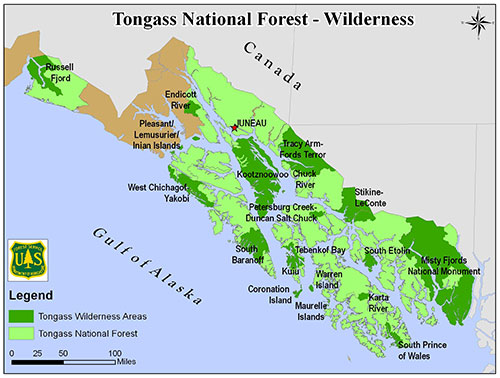
Murkowski: Forest Service Failing Alaska Communities
March 19, 2015
Thursday PM
(SitNews) Washington, D.C. - U.S. Senator Lisa Murkowski (R-AK) pressed U.S. Forest Service Chief Tom Tidwell Wednesday on the agency’s failure to address the needs of Southeast Alaska communities affected by federal forested lands in its 2016 budget request.
Murkowski, chairman of the Senate Appropriations Interior Subcommittee, criticized the Forest Service’s commitment to rural communities who depend on revenues from timber activities on federal forested lands.
“The Forest Service should manage our forests for multiple-use and sustained-yield and it doesn’t. While I appreciate the idea of the Forest Service mantra – ‘caring for the land, serving the people’ – it doesn’t feel like the service is living up to it in Southeast Alaska or across our country,” Murkowski said.

Southeast Alaska -- Tongass National Forest (light green) and Tongass Wilderness (dark green) Areas
Click here or on the map for a larger image...
Courtesy USFS
Significant reforms of federal management practices are needed to help rural communities survive, especially now that the roughly $300 million Secure Rural School program – which for years masked the problem of declining timber receipts by paying communities, including $14 million to communities in Southeast and Southcentral Alaska, directly from the federal treasury – was not reauthorized for fiscal year 2014. The current budget request calls for slightly more than $50 million to be shared with rural communities nationwide through the Payment to States program. Alaska’s share of that smaller program for the current fiscal year is $537,000.
“It is not a false choice to pursue both healthy local economies and healthy forests. We can have both through the active management of our national forests,” Murkowski said. “Doing so would reduce hazardous fuels loads and cut the hundreds of millions of dollars in subsidies we currently pay our logging communities in lieu of letting them harvest timber.”
Murkowski also pressed Chief Tidwell on the Forest Service’s plan for the Big Thorne timber sale in the Tongass National Forest, which has been held up by litigation filed by environmental groups. The Forest Service has repeatedly pledged to complete the Big Thorne sale to ensure that Southeast mills have enough wood to survive the agency’s move to only allow harvesting of second-growth trees in the future.
“Now when we are dealing with litigation based on our timber sales, we don’t have a lot of reasons to be optimistic and it’s greatly concerning to me,” Murkowski told Tidwell. “Even if the Big Thorne sale makes it out of litigation, there’s nothing more in terms of additional volume of timber harvests. The commitments we are receiving from the Forest Service are not translating into increased harvests.”
Murkowski said the Forest Service’s commitment to allowing Alaska to fully utilize its resources in order to provide needed economic activity to rural areas.
“The Forest Service’s actions to restrict activity in federal forests are suffocating local communities. First, the service restricts timber harvests. Then the service restricts hydropower energy and mining projects by not allowing sufficient flexibility in the way the roadless rule is applied in Alaska,” Murkowski said. “Put simply, the Alaskans are hurting because of the Forest Service’s restrictive policies and they need relief.”
Murkowski introduced legislation earlier this month (S. 631) to restore the roadless exemption in Alaska that was granted in 2003. That decision recognized that the “one-size-fits-all” rule adopted during the Clinton administration does not work in a ruggedly remote state like Alaska where little infrastructure exists.
The Forest Service manages more than 22 million acres of national forest lands in Alaska, including nearly all of the land in Southeast. That is more acres than the entire 52 national forests located in the eastern and southern United States combined.
In his remarks Chief Tidwell addressed issues regarding the Tongass National Forest in southeast Alaska, before the Senate Interior Appropriations Subcommittee when presenting his agency’s budget for FY 2016.
Commenting on Wednesday's hearing, Heather Urban, Senior Campaign Director of the Alaska Wilderness League said their organization was encouraged to see both the Subcommittee and Chief Tidwell acknowledge the need to address funding to support industries beyond timber in southeast Alaska.
Urban said in a prepared statement, "We agree that healthy communities and a healthy forest in southeast Alaska are not mutually exclusive. Meeting these twin goals means increasing funding for the Forest Service’s Tongass recreation programs, which are crucial to supporting sustainable and growing industries like tourism and fishing. These are the region’s two largest private industries, and they rely on a healthy forest and watersheds."
Edited by Mary Kauffman, SitNews
On the Web:
Listen to Chairman Murkowski’s opening statement & Chief Tidwell's responses:
https://www.youtube.com/watch?v=w-Y6ahxfP4Q&feature=youtu.be
Chief Tidwell's Testimony
http://www.appropriations.senate.gov/sites/default/
files/hearings/031815%20Chief%20
Tidwell%20Testimony%20-%20Interior.pdf
Source of News:
Office of U.S. Senator Lisa Murkowski
www.murkowski.senate.gov
Alaska Wilderness League
www.alaskawild.org
Publish A Letter in SitNews
Contact the Editor
SitNews ©2015
Stories In The News
Ketchikan, Alaska
|
Articles &
photographs that appear in SitNews may be protected by copyright
and may not be reprinted without written permission from and
payment of any required fees to the proper sources.
E-mail your news &
photos to editor@sitnews.us
Photographers choosing to submit photographs for publication to SitNews are in doing so granting their permission for publication and for archiving. SitNews does not sell photographs. All requests for purchasing a photograph will be emailed to the photographer.
|
|

